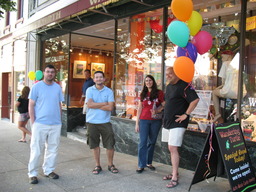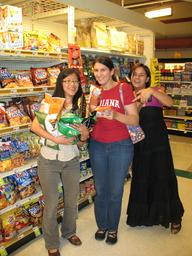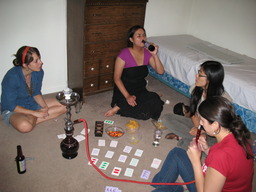
Chris, Aziz, Allison, & David
2010 SWSEEL Uyghur Students
Along Bloomington Gallery Walk
 Chris, Aziz, Allison, & David 2010 SWSEEL Uyghur Students |
"Anybody know any 'albatross stories'?", I proposed.
I was met with confused looks from all the other Uyghur-language students sitting around my apartment.
It's a shame that most of us didn't start hanging out together far earlier in the term. It's only now that this summer session is wrapping up that I've been spending much time with the students of the other levels of instruction: elementary and intermediate. They're all intelligent, interesting people and up for hanging out together playing games--albatross stories, included.
What led up to my suggestion to tell 'albatross stories' that evening?
Friday, everybody from all three classes (a grand total of seven) met up for an impromptu evening out. It was Jia-Yi's suggestion. We started with the "Downtown Bloomington Gallery Walk", an event of exhibition openings held every other month. We strolled from one block to the next chatting, taking in photographs and paintings created by mostly local artists. It was easy to discuss what we really thought about a particular piece without concern whether the artist or owner might be present: at more than one gallery Olga and I shared our opinions on the art speaking in Uyghur with one another. When the galleries closed, we all gathered over a round of drinks and a couple rounds playing the card game SET at a pub down the street from the last place we visited.
The gallery walk and drinks were a far more pleasant way to socialize--preferable to any previous group gathering. Most of the times we had met up before had been over obligatory "language tables" held twice-a-week after class in a charmless campus cafeteria. These get-togethers were a mandatory part of the curriculum and were supposed to create a setting in which students could engage in Uyghur-language conversation practice. But, sitting in a drab building with overpriced, greasy food had the effect of making everybody--student and teacher alike--want to finish up and get out as soon as possible.
 Jia-Yi, Allison, & Amber Stock up on Provisions for Evening |
A run to the grocery store provided products ample in sugar and salt to fuel the rest of the night. Anagrams had already become an obsession with a couple of the first-year students I had spent time with; when we'd had enough word games we played SET late into the night. But, I could tell at one point that interest in another round of either of those games was waning. Time for something new. I didn't have much else on-hand to offer in my simple sublet so proposed a game that would require no additional materials: telling albatross stories.
When it was clear that nobody else knew what I was talking about, I elaborated:
"Okay, I guess that's not a game everybody knows. I think it must be one of those parlor games people sat around playing back before TV or the Internet had been invented.
"Basically, you're given a scenario and have to figure out the background setup by asking questions. I can reply only 'yes' or 'no'. They're usually unlikely situations with some twist. You just have to ask a lot of questions to figure it out."
People seemed intrigued by an albatross story. I opened with the standard puzzle, from which the name (or is it only my siblings and I who call these "albatross stories"?) comes:
"A man walks into a restaurant. He sees they have albatross on the menu, sits down and orders it. When the dish is served he takes one bite, jumps out the window, and kills himself. What happened?"
 Playing SET |
"No," I said.
"Was he planning to kill himself before coming into the restaurant?"
"No."
"Was he reminded of something when he tasted the albatross?"
"Yes."
And so it went. They eventually figured out the elaborate, macabre background to that puzzle, as well as solutions to what other scenarios I narrated. Before that night, I had never recognized how morbid most of the premises were. (E.g., "Two men are found dead in a room with 52 bicycles, what happened?"; "A man receives a parcel with a human hand enclosed. He opens it, says, 'That's the last of them,' and throws it into the fire--what happened?").
I had fun telling the albatross stories, but wasn't sure what the others really thought about the game until the next night:
Saturday, students from another of the intensive summer language sessions (Tajik) hosted an informal round of drinks out on the porch of one of their homes. I stopped by late. Things were already drawing to an end. I said hello to a couple of the Uyghur students who had come to my place the night before.
"Hey," I said. "What have you all been up to?"
"Playing games."
"Too bad I missed it. What have you been playing?"
"Well, just now the Tajik students finally figured out the answer to your albatross story... ".